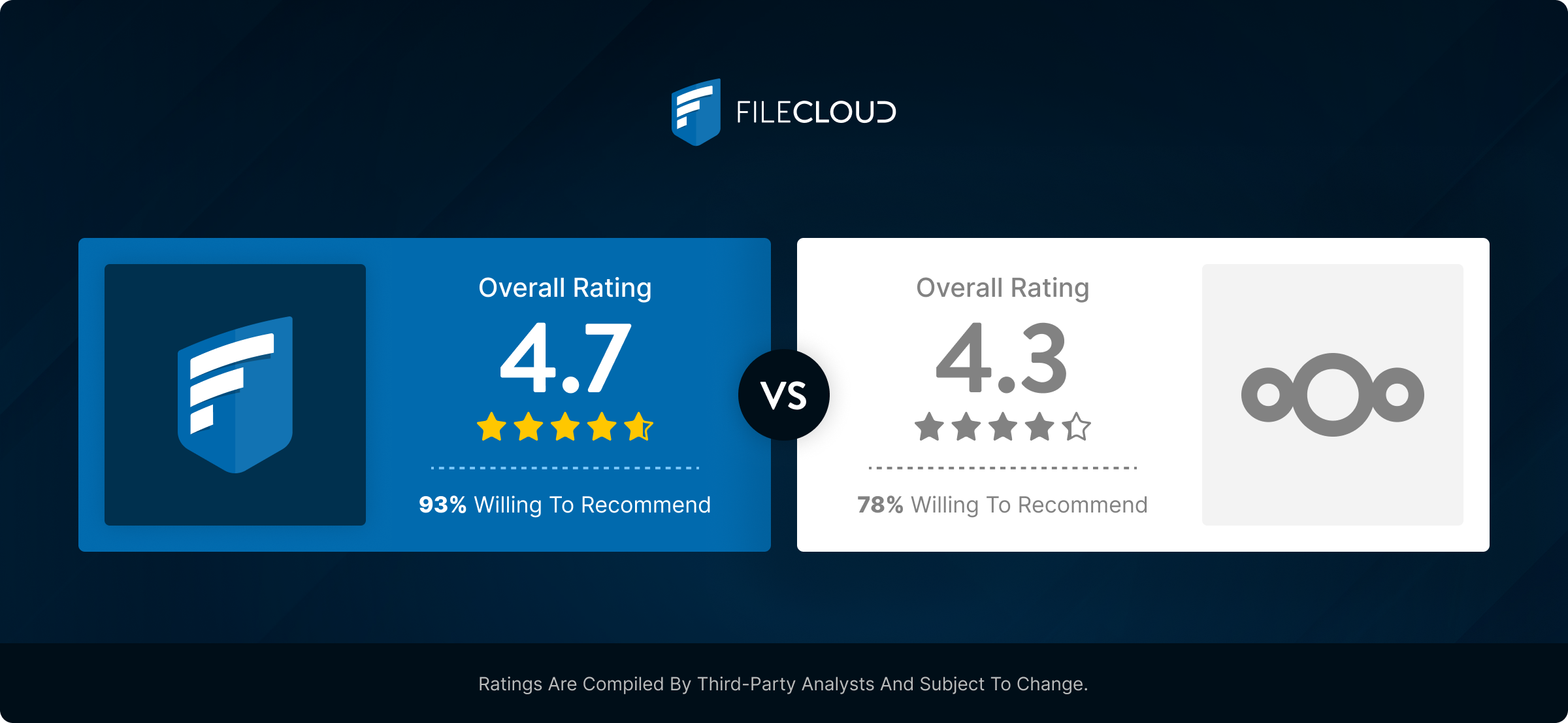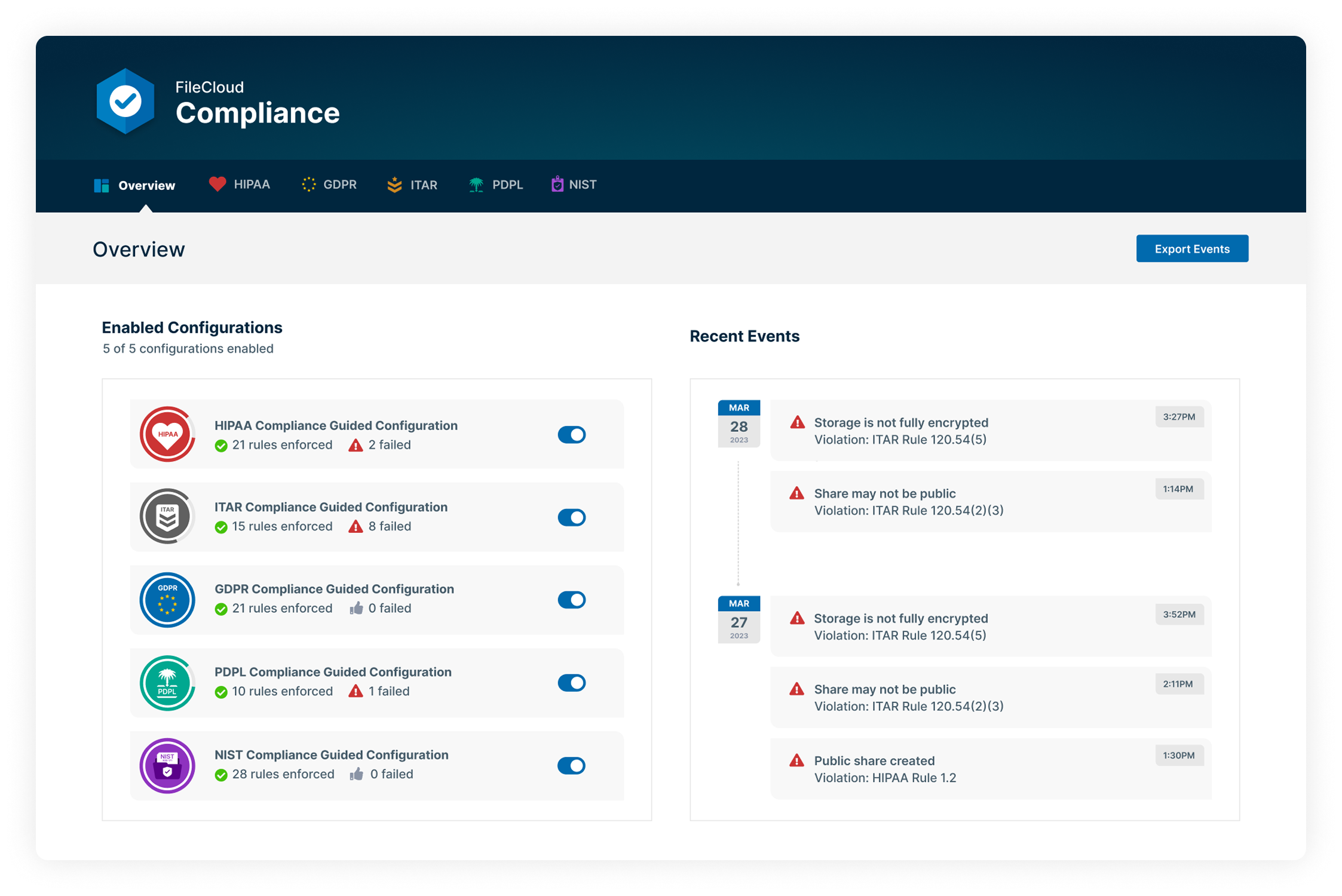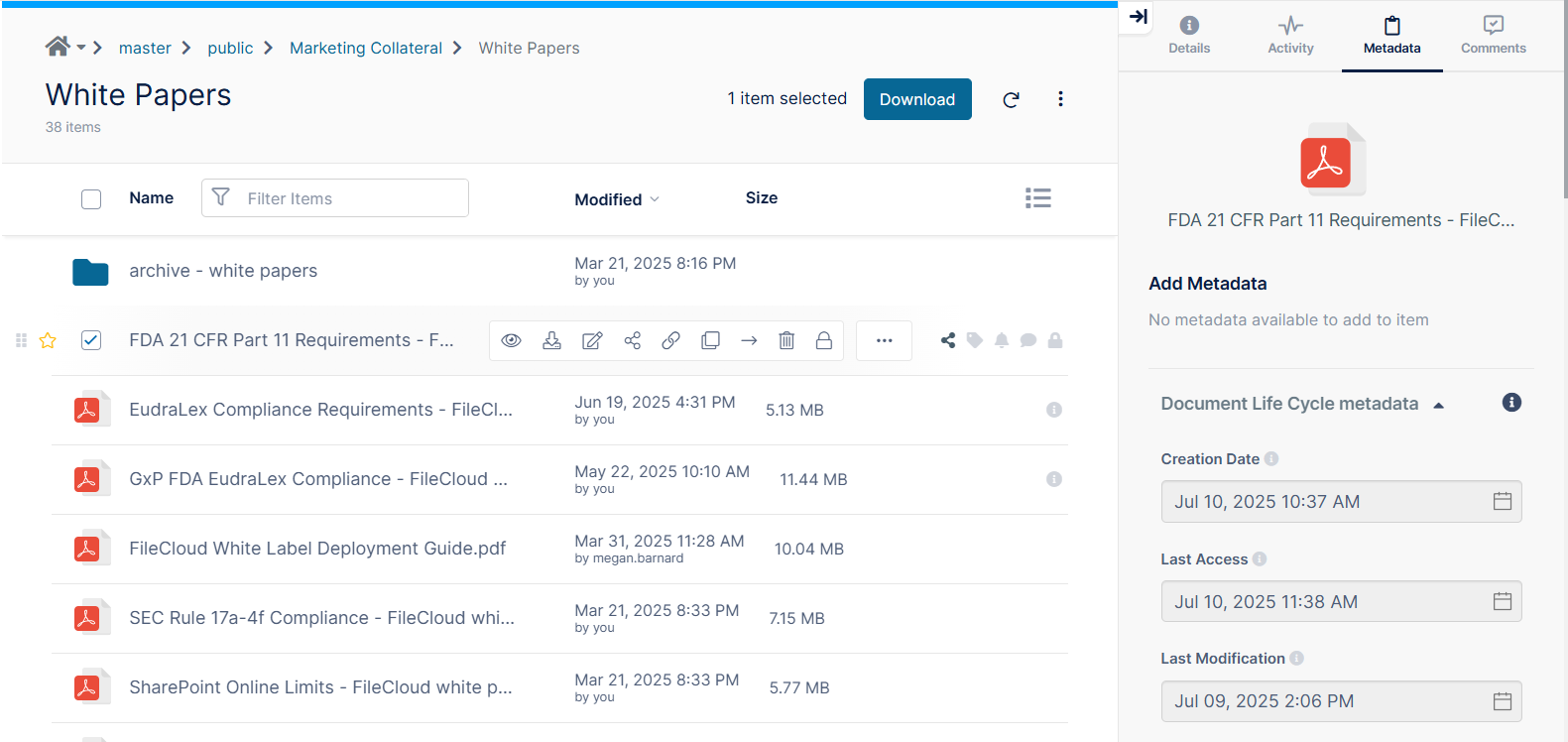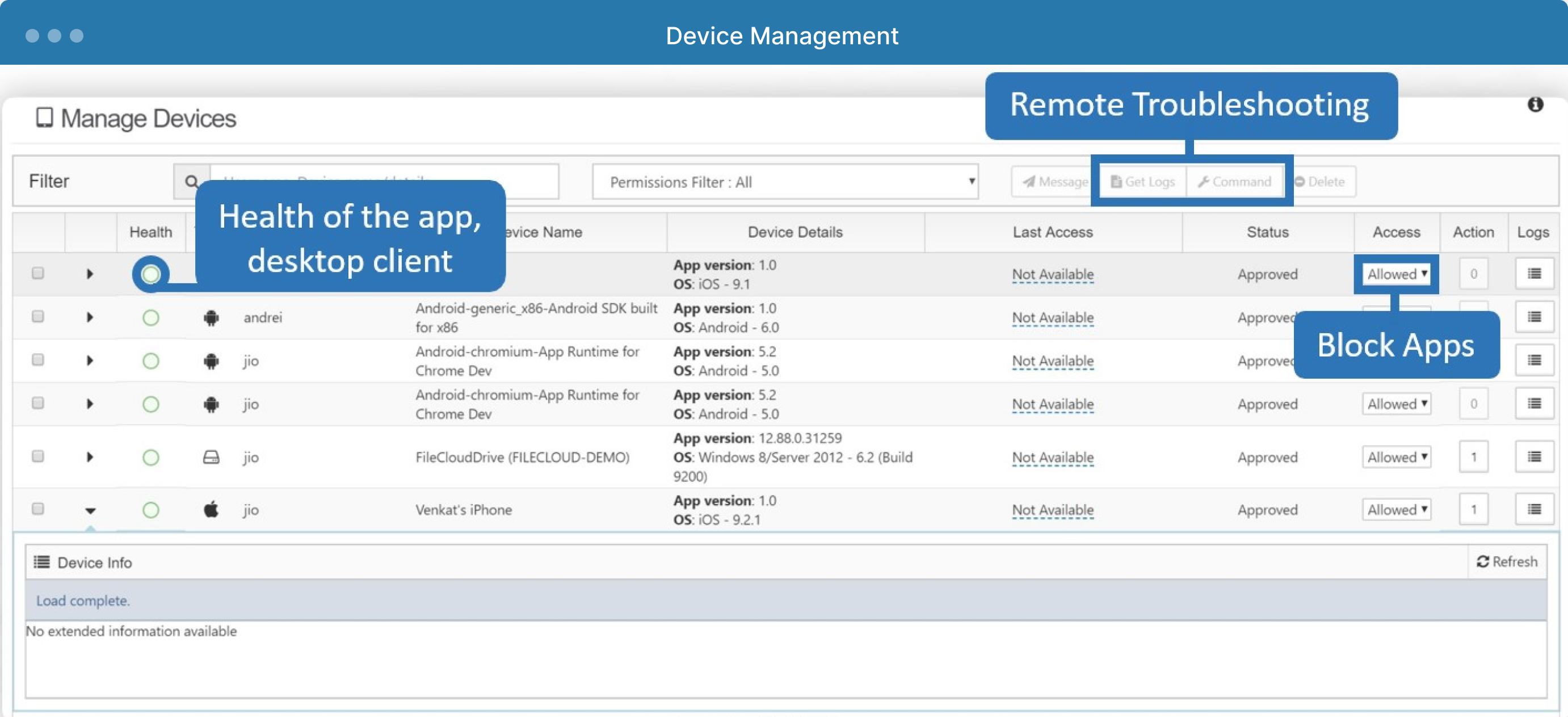Post updated July 21, 2025
Alternative to NextCloud for Enterprise File Sharing & Collaboration
Global organizations and enterprises face mounting challenges around IT infrastructure scaling, migration complexities, ballooning cloud storage expenses, and increasingly complex regulatory compliance requirements. Remote access bottlenecks and security vulnerabilities from shadow IT further complicate the picture.
The right enterprise file sync and share (EFSS) platform should address these pain points while providing centralized data visibility and governance functionalities that modern businesses demand. In this blog post, we evaluate how FileCloud Server (Essentials) measures up as an alternative to Nextcloud (Enterprise Standard).

Deployment in FileCloud vs Nextcloud
Deployment flexibility represents one of the most significant differentiators between these platforms. Nextcloud is limited to on-premises deployment only, offering no cloud or hybrid options. This restriction can create challenges for organizations seeking infrastructure flexibility or those looking to optimize costs through hybrid approaches.
FileCloud takes a fundamentally different approach, offering scalable on-prem, cloud, or hybrid deployment options. With FileCloud's Enterprise Server, organizations can maintain complete control over their data while hosting on their preferred infrastructure. The platform supports full on-premises deployment, self-hosted options on Windows, Linux, or Docker, and seamless integration with major cloud providers like AWS, Azure, and Alibaba.
FileCloud's advanced server sync capabilities enable multi-site replication, while high availability architecture ensures mission-critical deployments remain operational. For service providers, multi-tenant setup options provide the flexibility to serve multiple organizations, and dedicated single-tenant hosting delivers isolated environments when needed.
This deployment flexibility directly addresses common pain points around infrastructure scaling and migration challenges, while helping organizations avoid the trap of ballooning cloud storage costs through strategic hybrid implementations.

Nextcloud vs FileCloud Admin Capabilities
Both FileCloud and Nextcloud provide fundamental admin features like user storage quota management, group and policy creation, delegated admin powers, and detailed user and file activity reporting.
FileCloud distinguishes itself though with superior administrative visibility and control. Comprehensive audit logs and reports make environment monitoring simple with FileCloud. Admins are also able to leverage Active Directory integration through SAML SSO, to streamline user credentials for easier access across systems. With Nextcloud, these critical features are only accessible by upgrading to the Enterprise Premium tier.
Beyond interface advantages, FileCloud's admin capabilities extend to advanced multi-site architecture management, providing high-performance, scalable data access across distributed environments. This level of administrative control becomes particularly valuable for organizations managing complex, geographically distributed teams or those requiring advanced security monitoring and incident response capabilities.

FileCloud vs Nextcloud Security
Dovetailing closely with the admin capabilities, security is another major component where FileCloud has a competitive advantage.
FileCloud provides advanced FIPS 140-2 validated encryption, ensuring the highest security standards for both data at rest and in transit. Enterprises and organizations handling Controlled Unclassified Data (CUI) or subject to NIST compliance can easily satisfy the encryption requirement by running FileCloud in “FIPS mode.”
Additionally, the FileCloud platform includes comprehensive ransomware protection and advanced anti-virus/malware safeguards as standard features, and enterprises can also integrate with third-party security providers for SIEM, CASB, and Everfox CDR for comprehensive data monitoring.

Nextcloud lacks these security features. The platform offers no FIPS 140-2 validated encryption, no integrated ransomware protection or CDR, and key security features like advanced SSO, comprehensive audit logging, and enhanced antivirus protection are restricted to Enterprise Premium or Ultimate tiers.
FileCloud's security advantage directly addresses evolving threats to sensitive and confidential information, including ransomware, insider threats, and data loss scenarios that plague organizations using less comprehensive platforms.
Compliance & Governance in Nextcloud vs FileCloud
Regulatory compliance represents an increasingly complex landscape for data privacy and security requirements. FileCloud excels in this area thanks to specific deployment support paired with encryption, security tools, access controls, and data governance features.
Metadata management and content classification are available in both tiers of FileCloud (Essentials and Advanced). These tools support data visibility, so admins and users alike can leverage information while implementing secure protocols to prevent data loss or leaks.
For enterprises that require advanced levels of governance, including automation capabilities, FileCloud Advanced offers Smart Content Classification, hierarchical retention policies, and Smart DLP. The content engine in FileCloud will automatically scan and tag uploaded content based on admin-created rules. Once the content engine applies the relevant metadata tags, advanced file retention, DLP, and other automated policies are applied. This automated system supports an enterprise-grade content lifecycle and compliance management approach.
FileCloud’s compliance support doesn’t stop with this automation capacity. Advanced deployments can also leverage the Compliance Center, an intuitive interface with configurations for GDPR, HIPAA, NIST 800-171, ITAR, and KSA PDPL. These configurations connect regulatory requirements with features and functions in FileCloud, so admins can gain a clear understanding of how to enable EFSS compliance.

Nextcloud offers basic retention policies and simplified HIPAA and GDPR configurations, but lacks the comprehensive compliance framework and automated management tools that FileCloud provides, even at Enterprise Premium or Ultimate tiers.
Content Management in Nextcloud vs FileCloud
Both platforms cover essential content management features including real-time collaboration through web editing, unlimited file versioning, and file locking capabilities.
FileCloud's content management advantage lies in its sophisticated approach to data organization and accessibility. The platform offers metadata management with default and custom metadata sets, automated extraction and tagging capabilities, and full-text content search for comprehensive document discovery.

Additionally, FileCloud provides automatic metadata extraction from uploaded images, significantly reducing workload for organizations handling large arrays of visual content. This level of automated content intelligence helps organizations maintain better data visibility and governance without requiring extensive manual effort.
Nextcloud vs FileCloud Collaboration & Sharing
Collaboration capabilities in FileCloud extend beyond the basic file sharing in Nextcloud, to include advanced workflow automation and comprehensive integration support.
FileCloud offers extensive integration capabilities, including Microsoft Outlook, Microsoft 365, Google Workspace, and OnlyOffice/Collabora. These integrations work seamlessly within FileCloud's secure environment, ensuring collaboration doesn't compromise security. For a similar user experience, enterprises would need to upgrade to Nextcloud Enterprise Premium or Ultimate, or in the case of OnlyOffice, pay to add the capability to the license agreement.
Furthermore, FileCloud offers advanced an advanced workflow automation dashboard that includes a no-code workflow builder, centralized workflow manager, and user actions and notifications. End users can create workflows to streamline a wide variety of repetitive tasks and document processes, such as employee onboarding, contract approvals, project documentation distribution, and invoicing.

This workflow automation can be paired with Signority, FileCloud’s e-Signature integration. Document review and signature acquisition are easier than ever through the encrypted digital signature workflow, with protections in place to counter repudiation and tampering.
In comparison, Nextcloud users do not have access to workflow automation or an integrated e-Signature solution, which means administrators will need to outsource functionalities or enterprises will have to perpetuate less efficient, manual process flows.
Remote (Mobile) Access in FileCloud vs Nextcloud
Both platforms recognize the importance of remote and mobile access, providing mobile apps for iOS and Android, desktop sync capabilities, large file support, document preview, and drag-and-drop upload functionality.
FileCloud's advantage in remote access lies in its advanced resumable upload capabilities, addressing a critical pain point for remote workers dealing with unreliable network connections. This feature ensures that large file uploads can continue after network interruptions, preventing data loss and reducing frustration for mobile and remote users.
The platform also provides more sophisticated sync options, allowing users to selectively sync specified content based on their needs and device limitations. The secure remote access capabilities integrate with the platform's advanced security features, ensuring that mobile and remote access doesn't compromise organizational security posture. Features like secure document viewing and controlled sharing maintain data protection even when accessed from external networks and devices.

FileCloud vs Nextcloud Conclusion
The comparison between FileCloud and Nextcloud reveals significant differences in capability, flexibility, and value. While both platforms provide foundational content collaboration capabilities, FileCloud consistently delivers superior functionality and security at competitive pricing.
Ready to experience the FileCloud advantage firsthand? Sign up for a free trial to explore our comprehensive platform capabilities, or schedule a personalized demo to see how FileCloud can address your organization's specific content collaboration and security requirements.

Product Marketing Manager